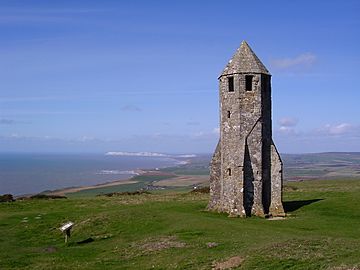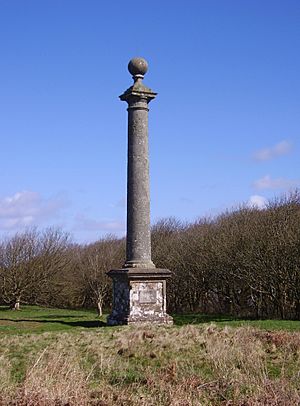St. Catherine's Down facts for kids
Quick facts for kids St Catherine's Down |
|
|---|---|

The "Pepperpot" on St. Catherine's Hill
|
|
| Highest point | |
| Elevation | 237 m (778 ft) |
| Listing | (none) |
| Geography | |
| Location | Isle of Wight, England |
| OS grid | SZ493773 |
| Topo map | OS Landranger 196 |
St. Catherine's Down is a large, open hill area on the Isle of Wight in England. It's made of chalk and is located close to St Catherine's Point, which is the most southern part of the island. This downland reaches a height of 240 meters at its highest point. You can find it between the towns of Niton and Chale.
Contents
The Pepperpot Lighthouse
One of the most famous landmarks on St. Catherine's Down is St. Catherine's Oratory. People often call it the "Pepperpot" because of its unique shape. This building is a stone lighthouse that was built a very long time ago, in the 14th century.
Who Built the Pepperpot?
The Pepperpot was started by a person named Walter De Godeton. He was ordered to build it after he took some wine from a shipwreck that belonged to the Church. To make up for what he did, he had to build and take care of this lighthouse. If he didn't, he would be kicked out of the Church.
How the Pepperpot Worked
The lighthouse was finished after Walter De Godeton passed away. A priest then looked after it. Fires were lit inside the tower to create a bright light. This light helped warn ships about the nearby coast, keeping them safe from crashing. There used to be a small chapel connected to the lighthouse, but it's not there anymore.
Ancient History on the Down
Near the Pepperpot, you can also find an ancient burial mound from the Bronze Age. This mound was explored by archaeologists in the 1920s.
Other Lighthouses
Over the years, people tried to build other lighthouses on St. Catherine's Down.
The "Salt Cellar"
In 1785, work began on a new lighthouse. However, it was never finished. The reason was that St. Catherine's Down often gets covered in thick fog, which would make a lighthouse there not very useful. The parts of this unfinished lighthouse that are still left are known locally as the "Salt Cellar."
St. Catherine's Lighthouse
A completely new lighthouse was built in 1837. This happened after a ship called the Clarendon crashed. This modern lighthouse is located to the west of Niton, at the bottom of an area called the Undercliff.
The River Medina's Start
St. Catherine's Down is also where the River Medina begins. This is the main river on the Isle of Wight. It flows north from the down, passing through the town of Newport, and eventually reaches the sea at Cowes.
The Hoy Monument
At the northern end of St. Catherine's Down, you'll find the Hoy Monument. This monument was built in 1814 by Michael Hoy. It was created to remember when the Russian Tsar visited Great Britain. Because of this, some people also call it the "Russian Monument."
Remembering Soldiers
At the bottom of the monument, there is a special plaque from 1857. This plaque honors soldiers who lost their lives during the Crimean War. The Hoy Monument was repaired in 1992, and the repairs cost £85,000, which was given as a donation.
 | Roy Wilkins |
 | John Lewis |
 | Linda Carol Brown |


